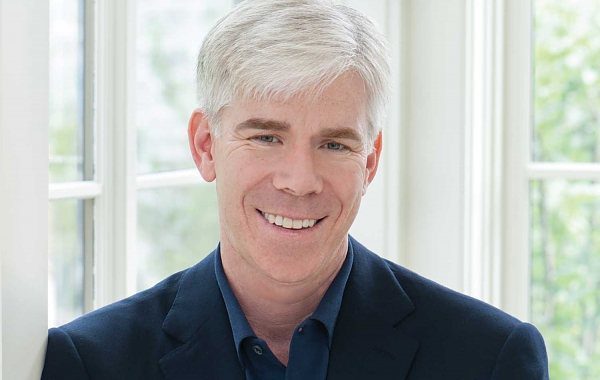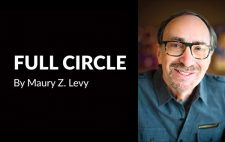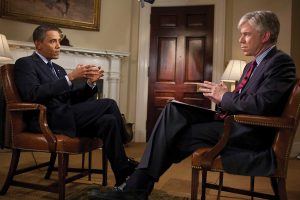
During his time at NBC, David Gregory interviewed President Barack Obama, and Presidents George W. Bush and Bill Clinton
As a White House correspondent and moderator of NBC’s “Meet the Press,” David Gregory was a familiar face in households across the U.S. But when suddenly fired last year, the 45-year-old journalist began to examine his life. Even with a strong marriage and three healthy kids, Gregory thought something was missing. The ongoing soul-searching that ensued lead to his new book, “How’s Your Faith? An Unlikely Spiritual Journey.”
Growing up in Los Angeles, Gregory and his sister lived with their mom, an alcoholic, who divorced their dad when he was 6. Their mother was a “lapsed Catholic,” Gregory says, so the family followed their father’s Jewish religion.
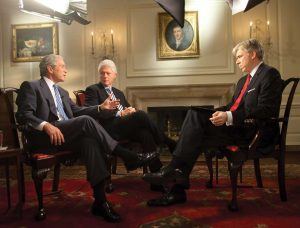 A defining moment in the family’s lives came when Gregory was 15.
A defining moment in the family’s lives came when Gregory was 15.
“I was at a speech tournament for the Optimist Club, and we were giving our speech and debate coach a ride home. My mother’s friend was in the car, as well,” he recalls. “My mother got pulled over on the highway, and she was arrested, handcuffed and taken away. My mother recalls a sense of relief when that happened because it was as if she had stopped running at that point, but she also had an empty feeling that there was no redemption.”
“For me at the time,” Gregory continues, “it was a panicked feeling, more about the fact that the secret was now out and couldn’t be concealed any longer. The path of it is my mom did find redemption. She took something that was broken in her life and made it better, and she’ll be sober 30 years next year. So it’s a story that ends well.”
Looking back, Gregory wishes he’d had more faith to help him through his difficult childhood moments. “I see the spiritual longing of the embarrassment, anger and confusion – kind of rudderless feelings that cried out for faith and trusting God that things would be OK,” he says.
Yet Gregory believes his home life pushed him to be successful. A news junkie who loved watching the evening broadcasts, he was especially drawn to stories from far-away lands, like the Soviet invasion of Afghanistan. He watched the Iran-Contra hearings as a teenager.
“I loved news and current events. I was drawn into the power of television to take you places,” he says. “To become a television journalist was something I became focused on, because I wanted to transform myself from what I was experiencing into something completely different.”
As a successful news journalist, Gregory reported on events of great importance, covering the White House and George W. Bush’s presidency for NBC News from 2001 to 2008. Gregory accompanied Bush to New York City after 9/11.
“Covering the president then was extremely moving because on that day and the subsequent days, I was the only television reporter who accompanied the president to Ground Zero,” he says. “On September 14, in that moment when he’s standing on the rubble with a bull horn, it was one of those experiences where I realized I had this front-row seat to history. History was unfolding on a daily basis then.”
Though Gregory skyrocketed to success, upon reflection, he regrets some of the choices he made. “I wish I had created a little more community around me within NBC and the broader Washington community, because I felt like my departure was met with a fair amount of indifference,” he says.
“One of the lessons I try to learn from that is maybe I was a little too out for myself and not doing enough to suggest to people that if I was doing well, they were doing well.”
“Being humbled in the middle of my life after a career that had nothing but success was good for me. It reminded me I have weaknesses; I’m going to have setbacks, and there’s more to life than this identity on television. It’s useful to have a broader perspective.”
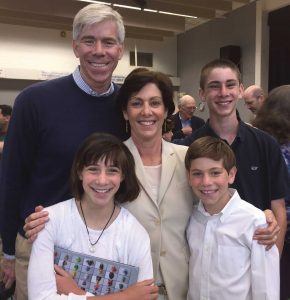
Gregory, his wife Beth and kids Max, 13 and twins Ava and Jed, 10
While the reflection after he was fired led Gregory to write his book, the newsman had begun examining his religion and faith years earlier. In his early 20s Gregory says he knew what being Jewish meant to his father, but needed to find his own answers. When he married his wife Beth, who was raised Methodist, they agreed to raise their family in his Jewish faith.
“She was not going to convert, but she was the one who really inspired me to go deeper into study and prayer,” he says. “She said, ‘I know what you are – culturally and ethnically Jewish – but what do you believe?’ That was a real challenge that I took up.”
“This was 2007, I was covering the White House at the time,” he recalls. “I felt a sense of: How do I express gratitude for my life? What else is expected of me? How do I be a person of faith and a Jew with a sense of meaning and purpose?”
Gregory says part of his inspiration for the book was drawn from President Bush, who he covered for NBC from 2001-2008. Gregory watched Bush’s own transformation through faith, he says. And it was Bush who gave Gregory the idea for the book’s title. Knowing Gregory was exploring his spirituality, the President one day asked him, “How’s your faith?”
While researching his book, Gregory interviewed religious leaders of all faiths.
“Cardinal Dolan [New York’s Archbishop] said approaching faith as a project can be a mistake,” Gregory says. “That spoke to me. Sometimes in my studies, understanding where I was in Jewish life became more of an intellectual exercise. He went on to say it’s really an act of love. It was impactful, because I realized once this pursuit of God and trying to deepen my faith became an act of my heart more than my head, then I’d be on to something.”
Gregory believes a person can have faith even if they aren’t religious. He sees people turning away from organized religion for many reasons. “They don’t like being judged or the expectation of organized religion,” he says.
“People are more distrustful of institutions, period, and of authority. There are aspects of doctrine that turn off people. They look at organized religion as being a source of division and even bloodshed around the world. So they decide to pursue their own spiritual path and pursue God in their own way.”
The question of “How’s your faith?” is important, he says, because it’s an invitation to self examination. “Who am I? Who am I trying to be? This has become the larger journey of my life, trying to connect to faith and examine the questions that are most important.”

